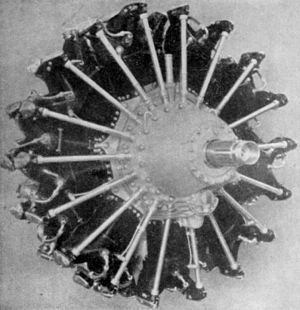This article includes a list of references, related reading, or external links, but its sources remain unclear because it lacks inline citations. (July 2014) |
The Fiat A.80 was an 18-cylinder, twin-row, air-cooled, radial aircraft engine produced during World War II. Rated at 750 kW (1,000 hp), it was a more powerful development of the 14-cylinder Fiat A.74.
| A.80 | |
|---|---|

| |
| Type | Radial engine |
| National origin | Italy |
| Manufacturer | Fiat |
| Major applications | |
| Developed from | Fiat A.74 |
| Developed into | Fiat A.82 |
Variants
edit- Fiat A.80 R.C.20
- With reduction gear and supercharger, rated altitude 2,000 m (6,600 ft).
- Fiat A.80 R.C.40
- With reduction gear and supercharger, rated altitude 4,000 m (13,000 ft).
- Fiat A.80 R.C.41
- With reduction gear and supercharger, rated altitude 4,100 m (13,500 ft).
Applications
editSpecifications (A.80 R.C.41)
editData from [citation needed]
General characteristics
- Type: 18-cylinder air-cooled radial
- Bore: 140 mm (5.51 in)
- Stroke: 165 mm (6.50 in)
- Displacement: 45.72 L (2789.9 cu in)
- Length: 1,155 mm (45.47 in)
- Width: 653 mm (25.71 in)
- Height: 1,335 mm (52.56 in)
- Dry weight: 725 kg (1598.4 lb)
Components
- Valvetrain: One intake and one sodium-cooled exhaust valve per cylinder
- Supercharger: Single Speed, Single Stage. 4,100 m rated altitude
- Fuel system: 1 Fiat carburettor
- Fuel type: 87 octane
- Cooling system: air-cooled
Performance
- Power output: 750 kW (1,000 hp) at 2,100 rpm at 4,100 m (13,500 ft)
- 820 kW (1,100 hp) at 2,100rpm at Sea Level
- Compression ratio: 6.7:1
- Power-to-weight ratio: 1.0 kW/kg (0.6 hp/lb) at cruise speed
See also
editRelated development
Related lists
References
editWikimedia Commons has media related to Fiat A.80.
- Gunston, Bill. (1986). World Encyclopaedia of Aero Engines. Patrick Stephens: Wellingborough. p. 56
- Ragazzi, Paolo (1938). The Power of Aircraft Engines at Altitude. p. 3